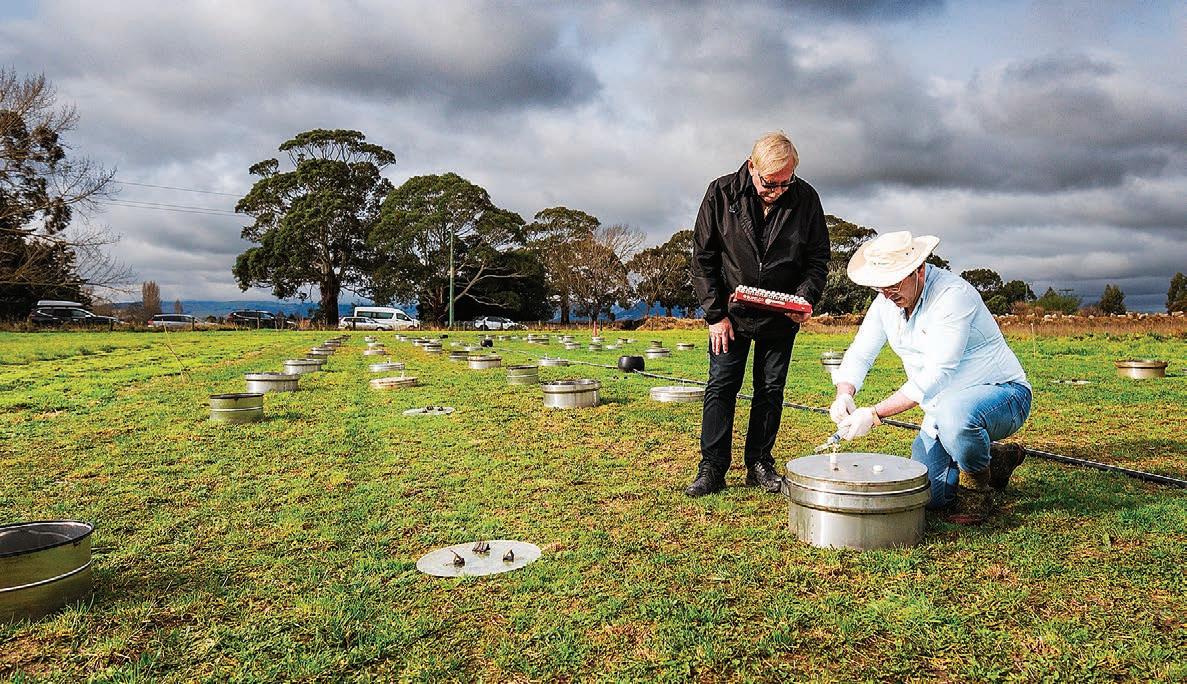
2 minute read
Funds for GHG-fighting fungi
FIELD OF STUDY: Professor John Hampton and Dr Hossein Alizadeh of Lincoln University collect a nitrous oxide sample.
Calving 2022
Support lifetime traceability
• Ensure all Calves are fitted with a NAIT tag before they reach 180 days of age. • Register any fitted NAIT tags within 7 days of tagging. • All calves must be tagged and registered before their first movement. So, if you are sending them off your location, make sure you meet your NAIT obligations. • Calves must be NAIT tagged correctly.
For more information go to OSPRI.co.nz or 0800 842 463
NAIT is an OSPRI programme
Funding for gas fighting fungi
BusinessDesk and staff reporters
THE Government is spending $7.3 million over seven years in a programme intended to reduce agricultural greenhouse gases and nitrate leaching, Agriculture Minister Damien O’Connor said.
The N-Vision NZ programme comprises:
N-Retain – a new nitrification inhibitor technology that will look at new ways to block the biological processes in the soil that lead to nitrous oxide emissions and nitrate leaching.
N-Test – a new soil test to inform nitrogen fertiliser decisions on pastoral farms, which will help capitalise on the nitrogen already in soil organic matter.
N-Bio Boost – a fungal bio-inoculant to increase nitrogen use efficiency, which will examine how naturally occurring fungi boost the nitrogen efficiency of plants as another way to future-proof productivity.
“For our future, we need innovative tools and technologies to help farmers reduce nitrogen fertiliser use on pastoral farms while maintaining production and profitability,” O’Connor said.
Funds for the N-Vision NZ programme are from the Ministry for Primary Industries’ Sustainable Food and Fibre Futures (SFF Futures) fund.
Christchurch-based fertiliser and agrichemical coop Ravensdown is leading the programme and will contribute $11m cash, with Lincoln University and Plant & Food Research providing research expertise. Ravensdown and Lincoln University will contribute in-kind funding to the value of $3.8m.
Ravensdown general manager of innovation and strategy Mike Manning said the N-Bio Boost project will harness the power of humble natural strains of soil fungi to increase the efficiency of nitrogen use by plants.
“Lincoln University researchers have discovered natural strains of fungi that reduce the activity of specific microbes, which are involved with nitrogen cycling and losses. These nitrogen losses can occur as nitrate leaching through the soil, which has potential detrimental effect on waterways, and as nitrous oxide, a potent greenhouse gas emission,” Manning said.
“Although it occurs naturally in pastoral soils at a relatively low level, the fungi can be applied to soil as either a prill or seed coating. Doing so increases the level of the fungi and therefore alters the nitrogen cycle to reduce nitrogen losses. Research to date indicates this has a strong potential to mitigate both greenhouse gas emissions and reduce nitrogen loss to waterways,” he said.
N-Vision NZ will apply leading edge science and technology to create tools that farmers can use on farm. Importantly farmers will have options to maintain profitability while minimising the environmental impact of their land use.
O’Connor said the products and technologies developed through the N-Vision NZ programme will be made widely available under commercial terms.
“This will ensure that the environmental and economic benefits extend to the whole of NZ and not just Ravensdown’s customers,” he said.



